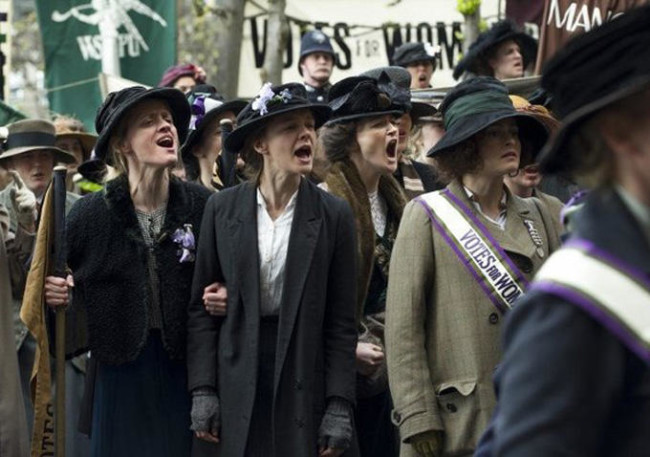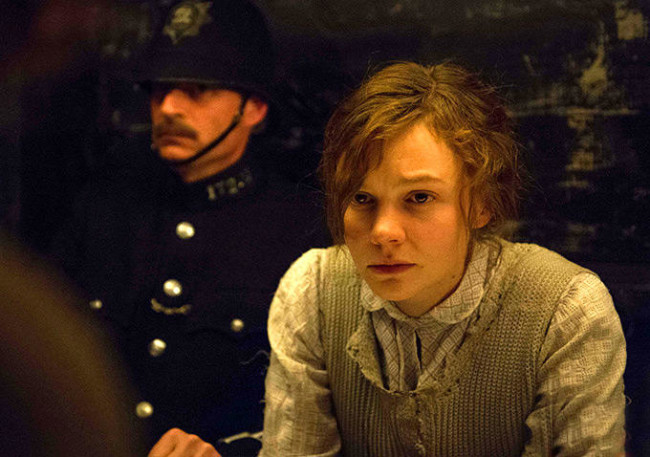
After an inexcusably tone deaf promotional photo shoot featuring the film’s white stars wearing shirts emblazoned with the Emmeline Pankhurst quote, “I’d rather be a rebel than a slave” (it’s a given that most of the wearers are arguably neither), I was pleasantly surprised to find that the British period drama Suffragette proves itself to be surprisingly current and unsparingly heartbreaking.
Set in turn of the century London, Suffragette is a kind of Anti-My Fair Lady, following protagonist Maud (Carey Mulligan) as she changes from an apolitical worker in a steam laundry to a militant suffragette, brushing shoulders with the likes of Emmeline Pankhurst (Meryl Streep) and Edith New (Helena Bonham Carter, called Edith Ellyn in the film). The circumstances that start her on this path are a bit too much of a perfect storm, but Mulligan’s intensity makes Maud’s passion and commitment believable. Equally intense are the more intimate scenes of Maud with her devastatingly adorable son (Adam Michael Dodd), and the pair of them deliver some very necessary moments of humor and affection, as well as some of the most emotionally distressing scenes in the film.
Mulligan isn’t the only standout; Anne-Marie Duff excels as jaded-veteran-with-a-heart-of-gold Violet Miller and Helena Bonham-Carter is charismatic and smart as East London ringleader Edith Ellyn, although the no-nonsense commitment of her character makes me feel like some of her charm wasn’t used to its full potential. On the other end, Romola Garai is forgettable and unsympathetic as wealthy suffragette Alice Haughton, and the cabal of white government men who pursue the militants is virtually indistinguishable from the group from The Imitation Game or really any other historical drama. Meryl Streep has a fleeting cameo as fearless leader Emmeline Pankhurst. Although her part is small, she’s perfect for it because only Goddess Queen Meryl Streep can inspire the kind of instant admiration and recognition to make the on-screen crowd’s enthusiasm relatable to viewers. Her few lines are crowded with quotable moments, which is representative of some of the more heavy-handed moments of the film. Sometimes the injustices the women of Suffragette suffer are verbally explained to the audience in no-uncertain terms, as if without those bits of dialogue we’d have no way of understanding the injustice of a mother separated from her child or the physical abuse of women’s bodies.

While it can sometimes be a bit too much, in some ways the heavy-handedness of the script demonstrates to the audience how much we owe to the kind of “militant” feminism that is so often derided in post-Roe v. Wade America (members of the police force say “suffragette” with the exact disdain with which Rush Limbaugh says “feminazi”). I appreciated how true to the source the script was, and how much of a departure it was from the typical de-radicalization of first wave feminism (think Mrs. Banks from Mary Poppins). On the contrary, because the women of Suffragette are subjected to endlessly brutal systemic violence, their decidedly non-peaceful actions, directed not at bodies but at the “sacred idol of property” seem almost cathartic in contrast. When Pankhurst declares in the film “If something must be broken before this crusade is over, let it be the windows of London’s shops, not the bodies of women,” the audience can’t help but agree.
Although the group’s tactics seem awe-inspiringly courageous in retrospect, it’s hard to imagine a movement today that could build similar support while resorting to similar tactics. Is it the benefit of hindsight that make their riots “more okay” to us than the ones that were plastered over Fox News in its coverage of Ferguson or Baltimore? Or is it because the people throwing the rocks aren’t archetypally unthreatening white women this time around? Parts of the film will seem uncannily familiar to a culturally literate viewer; brutal scenes of police brutality wouldn’t be out of place on YouTube today, and when the Head Investigator (Brendan Gleeson) implores Maud to follow the law and wait more patiently for her rights to be bestowed on her it’s as if he’s quoting a Stanford Review opinion piece. And ultimately that’s the takeaway from Suffragette, including and especially it’s well-chosen ending; as women, and as humans, we’ve come so far, but we’ve got so very far to go.
***
Photos courtesy of here

Romola Garai
October 9, 2016 at 9:51 am (8 months ago)Despite the somewhat melodramatic tone, Carey and the other actresses kept me glued to the screen. It also brings up issues relevant to today’s social movements, such as, is violence ever acceptable in pursuit of social justice? The combination of real and fictitious characters worked for me, and the production values were good.
Carey Mulligan
April 15, 2017 at 4:03 am (2 months ago)Great actors, great actings, awesome storytelling, cinematography at its best, direction was amazing and the music was so pleasant, but the method of dealing was a bit gruesome, and sometimes brutal. I thought the terrorism is a new word, but this movie gives a different perspective and meaning to that.